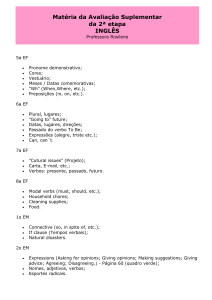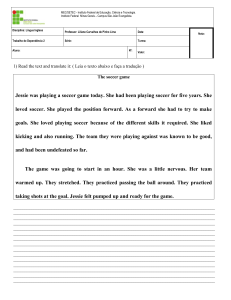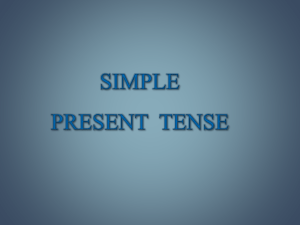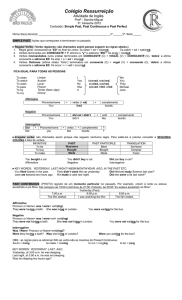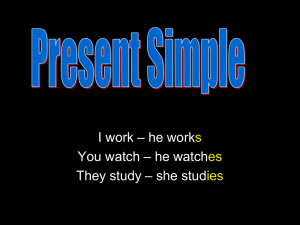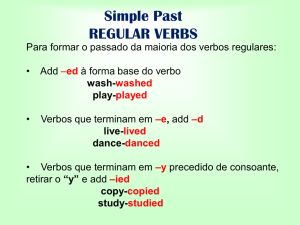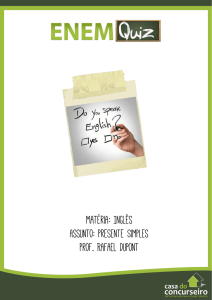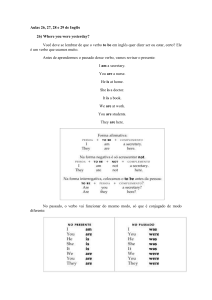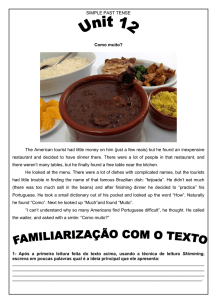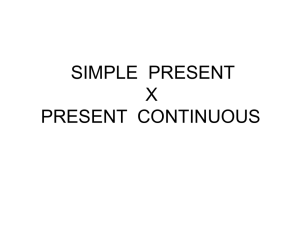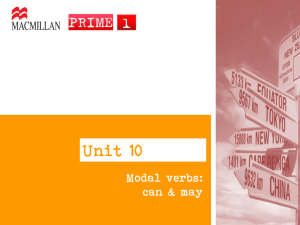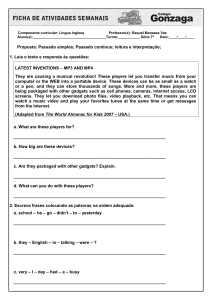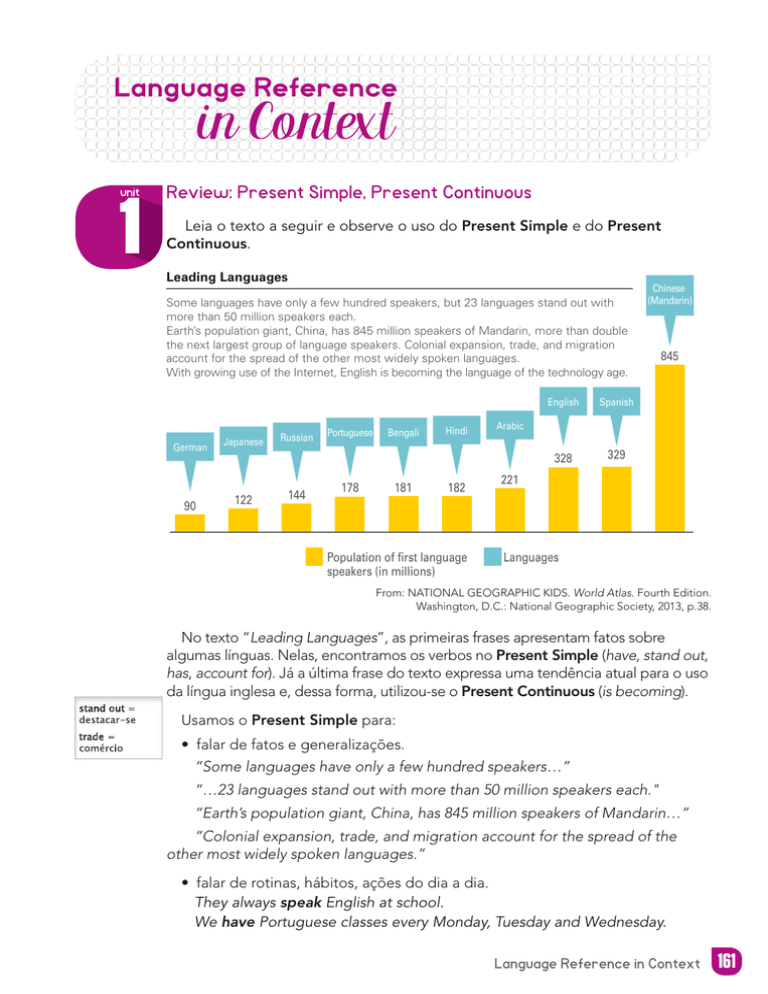
Review: Present Simple, Present Continuous
Leia o texto a seguir e observe o uso do Present Simple e do Present
Continuous.
Leading Languages
Some languages have only a few hundred speakers, but 23 languages stand out with
more than 50 million speakers each.
Earth’s population giant, China, has 845 million speakers of Mandarin, more than double
the next largest group of language speakers. Colonial expansion, trade, and migration
account for the spread of the other most widely spoken languages.
With growing use of the Internet, English is becoming the language of the technology age.
German
90
Japanese
122
Russian
144
Portuguese
178
Bengali
181
Hindi
182
Population of first language
speakers (in millions)
English
Spanish
328
329
Chinese
(Mandarin)
845
Arabic
221
Languages
From: NATIONAL GEOGRAPHIC KIDS. World Atlas. Fourth Edition.
Washington, D.C.: National Geographic Society, 2013, p.38.
No texto “Leading Languages”, as primeiras frases apresentam fatos sobre
algumas línguas. Nelas, encontramos os verbos no Present Simple (have, stand out,
has, account for). Já a última frase do texto expressa uma tendência atual para o uso
da língua inglesa e, dessa forma, utilizou-se o Present Continuous (is becoming).
Usamos o Present Simple para:
• falar de fatos e generalizações.
“Some languages have only a few hundred speakers…”
“…23 languages stand out with more than 50 million speakers each."
“Earth’s population giant, China, has 845 million speakers of Mandarin…”
“Colonial expansion, trade, and migration account for the spread of the
other most widely spoken languages.”
• falar de rotinas, hábitos, ações do dia a dia.
They always speak English at school.
We have Portuguese classes every Monday, Tuesday and Wednesday.
Language Reference in Context
161
Usamos o Present Continuous para:
• falar de ações que ocorrem no momento da fala/escrita.
They are talking about leading languages.
He is exploring a graph right now.
• expressar mudanças que ocorrem momentaneamente (tendências atuais).
“English is becoming the language of the technology age.”
Many people are using English on the Internet nowadays.
Veja, no quadro a seguir, as regras ortográficas para verbos terminados em -ing.
Regras ortográficas para verbos terminados em -ing
Exemplos
A maioria dos verbos:
verbo + ing
do + ing ѧ doing
talk + ing ѧ talking
Verbos terminados em e:
verbo - e + ing
use - e + ing ѧusing
become - e + ing ѧbecoming
Verbos terminados em consoante + vogal + consoante: stop + p + ing ѧstopping
swim + m + ing ѧswimming
verbo + última consoante + ing
Extra Practice
The text below is about school enrolment. Complete
it with the correct form of the verbs in parentheses. Use
the Present Simple or the Present Continuous tense.
Education
(prepare) children to
participate in society and to find a place in the world of
work. School enrolment rates
Pal Teravagimov/Shutterstock/Glow Images
die - ie + ing ѧdying
lie - ie + ing ѧlying
Verbos terminados em ie:
verbo - ie + y + ing
(rise),
but many children still
(grow up) without
access to a basic education. There are many reasons why children
(not get) even a primary education. (...)
From: COLLINS World Watch: a dynamic visual guide packed with fascinating facts about the world.
2nd edition. Glasgow: HarperCollins Publishers, 2012, p. 34. (fragment)
Future with will
Leia o texto a seguir e observe o uso de will.
CLS Design/Shutterstock/
Glow Images
What is the Future of the English Language?
162
English, as any other language, is a living and dynamic system,
and it transforms according to the way its speakers use it. For this
reason, today’s English will be very different in about a century. (...)
From: <http://termcoord.eu/2014/07/future-english-language>.
Accessed in: March 2015. (fragment)
No texto “What is the Future of the English Language?”, o trecho “today’s
English will be very different in about a century” refere-se ao futuro da língua
inglesa daqui a aproximadamente cem anos.
• Usamos will para nos referirmos ao futuro.
New varieties of English will spread.
Forma afirmativa
I
You
will
very different
in the future.
be
He / She / It
We / You / They
Veja, nos quadros a seguir, as formas negativa e interrogativa de will.
• Em frases negativas, usamos not depois do will e antes do verbo principal.
English will not be the same in about a hundred years.
Forma negativa
I
You
will
not
the same in
the future.
be
He / She / It
We / You / They
(will not = won’t)
• Em frases interrogativas, usamos will antes do sujeito.
According to the text, will English be different in the future? Yes, it will.
Forma interrogativa
I
you
Will
be
he / she / it
different in the
future?
we / you / they
Respostas curtas
Afirmativa
Negativa
I
Yes,
you
he / she / it
we / you / they
I
will.
No,
you
won’t.
he / she / it
we / you / they
Language Reference in Context
163
Extra Practice
In each item below, put the words into the correct order to make sentences.
a.
be/Online learning/a more efficient way to learning languages/will
b.
will/English/be/the most important language in the future
c.
won’t/Spanish/so popular worldwide as English/be
Making Comparisons (The Comparative Form)
© 1950 Peanuts Worldwide LLC.
/Dist. by Universal Uclick
Leia a tirinha a seguir e observe o uso do Comparative Form.
Available at: <www.gocomics.com/peanuts/1950/11/01>. Accessed in: February, 2015.
Na tirinha, a menina faz várias comparações entre Charlie Brown e o outro
menino. Usamos o comparativo de superioridade (more… than) para dizer que
um elemento é superior a outro em algum aspecto.
“Are you stronger than Charlie Brown?”
“Are you older than Charlie Brown?”
“Are you smarter than Charlie Brown?”
Regras ortográficas para formar adjetivos no grau comparativo
A maioria dos adjetivos:
adjetivo + er
strong + er ѧstronger
old + er ѧolder
Adjetivos terminados em e:
adjetivo + r
wise + r ѧwiser
nice + r ѧnicer
Adjetivos terminados em consoante + vogal +
consoante:
adjetivo + última consoante + er
fat + t + er ѧfatter
big + g + er ѧbigger
Adjetivos terminados em consoante + y:
adjetivo - y + ier
angry - y + ier ѧangrier
funny - y + ier ѧfunnier
Adjetivos
longos
more + adjetivo
difficult ѧmore + difficult
important ѧmore +
important
Formas
irregulares
good ѧ better
bad ѧ worse
far ѧ farther / further
Adjetivos
curtos
164
Exemplos
Extra Practice
Lucy
bossy, crabby (bad-tempered)
a.
b.
c.
d.
Patty
not so smart, good at sports
Marcie
smart, bad at sports
Lucy is
than Marcie. (bossy)
Lucy is
than Patty. (crabby)
Patty is
at sports than Marcie. (good)
Marcie is
Ilustrações: © Peanuts Worldwide LLC./Dist. by Universal Uclick
Based on the characteristics of the following characters, complete the
sentences below with the comparative form of the adjectives in parentheses.
than Patty. (smart)
Making Comparisons (The Superlative Form)
Filipe Frazao/Shutterstock/Glow Images
Leia o texto a seguir e observe o uso da Superlative Form.
Speaking of São Paulo state without using superlatives is difficult. The southern
hemisphere’s largest city! Its finest museums! Its best restaurants! Its worst traffic!
(Well, you can’t have everything.) São Paulo city – Sampa to locals – serves as
Brazil’s Boom Town, commercially, financially, industrially and culturally (...).
From: LONELY Planet Brazil. 9th Edition, November 2013, p. 215.
No texto, vemos que São Paulo é a maior cidade do hemisfério sul, com os
melhores museus e restaurantes, mas o pior trânsito. Usamos o superlativo (the
most…) para dizer que um elemento, em um grupo, alcança o grau mais alto no
aspecto em que é comparado.
“The southern hemisphere’s largest city.”
São Paulo has the finest museums, the best restaurants, but the worst traffic.
Language Reference in Context
165
Regras ortográficas para formar adjetivos
no grau comparativo
Adjetivos
curtos
Exemplos
A maioria dos adjetivos:
the + adjetivo + est
the + strong + est ѧ the strongest
the + old + est ѧ the oldest
Adjetivos terminados em e:
the + adjetivo + st
the + large + st ѧ the largest
the + fine + st ѧ the finest
Adjetivos terminados em consoante +
vogal + consoante:
the + adjetivo + última consoante + est
the + fat + t + est ѧ the fattest
the + big + g + est ѧ the biggest
Adjetivos terminados em consoante + y: the + angry - y + iest ѧ the angriest
the + funny - y + iest ѧ the funniest
the + adjetivo - y + iest
Adjetivos
longos
Formas
irregulares
difficult ѧthe most + difficult
important ѧthe most + important
the most + adjetivo
good ѧ the best
bad ѧ the worst
far ѧ the farthest/the furthest
Extra Practice
Complete the following sentences with the superlative form of the
adjectives in parentheses.
a.
b.
Brazil has some of
beaches on earth. (fine)
Spread between Argentina and Brazil, Iguaçu Falls are some of
waterfalls on earth. (spectacular)
c.
Seen from the peak of Pão de Açúcar, Rio is undoubtedly
city in the world. (beautiful)
d.
By far
diving in the country is in the Fernando de
Noronha archipelago. (good)
From: LONELY Planet Brazil. 9th Edition, November 2013.
Past Simple (Verb To Be)
Leia o texto a seguir e observe o uso do verb to be no Past Simple.
FAQ
Frequently Asked Questions
3. When was Nelson Mandela’s birthday?
18 July
4. How old was Nelson Mandela?
The late former President Mandela was 95 when he died.
5. What were the names of Nelson Mandela’s parents?
His father was Nkosi (Chief) Mphakanyiswa Mandela and his mother was
Nosekeni Mandela.
Available at: <www.nelsonmandela.org/content/page/faqs>. Accessed in: March 2015. (fragment)
166
• Was e were são a forma do verb to be no Past Simple.
“When was Nelson Mandela’s birthday?”
“How old was Nelson Mandela?”
“What were the names of Nelson Mandela’s parents?”
Forma afirmativa
I
was
You
were
He / She / It
was
We / You / They
were
from South Africa.
Veja, nos quadros a seguir, as formas negativa e interrogativa do verb to be no
Past Simple.
• Em frases negativas, usamos not
depois do verb to be (was/were).
Mandela’s parents were not
teachers.
• Em frases interrogativas, usamos o
verb to be (was/were) antes do sujeito.
Was Mandela an anti-apartheid
leader? Yes, he was.
Forma negativa
Forma interrogativa
I
was
You
were
not
He / She / It
was
We / You / They
were
from South
Africa.
Was
I
Were
you
Was
he / she / it
Were
we / you / they
from South
Africa?
(was not = wasn’t; were not = weren’t)
Respostas curtas
Afirmativa
Yes,
Negativa
I
was.
you
were.
he / she / it
was.
we / you / they were.
No,
I
wasn’t.
you
weren’t.
he / she / it
wasn’t.
we / you / they
weren’t.
Extra Practice
Based on the FAQ about Nelson Mandela, complete the following
sentences with was or were.
a. Nelson Mandela
born on 18 July.
b. He
95 when he died.
c. His parents
Nkosi Mandela and Nosekeni Mandela.
Language Reference in Context
167
Past Simple (Regular Verbs)
© 2013 Paws, Inc. All Rights Reserved/
Dist. Universal Uclick
Leia a tirinha a seguir e observe o uso do Past Simple.
DAVIS, Jim. Garfield. Available at: <http://garfield.com/comic/2013-10-14>. Accessed in: March 2015.
Na tirinha, o Past Simple é utilizado para dizer que Garfield ficou acordado
por muito tempo na tarde passada. Note que, na tirinha, foi utilizado o verbo
regular no Past Simple (stayed).
• Todos os verbos regulares no Past Simple terminam em ed.
“I stayed up too late last afternoon.”
He watched TV in the morning.
Regras ortográficas para verbos regulares no Past Simple
Exemplos
A maioria dos verbos:
verbo + ed
stay ѧ stayed
watch ѧ watched
Verbos terminados em e:
verbo + d
live ѧ lived
use ѧ used
*Verbos terminados em consoante + vogal + consoante:
verbo + última consoante + ed
shop ѧ shopped
plan ѧ planned
Verbos terminados em consoante + y:
verbo - y + ied
cry ѧ cried
study ѧ studied
* Exceto os verbos terminados em w, x, y. Também não dobramos a última consoante quando a
primeira sílaba for tônica, como em offered, visited.
• Usamos, geralmente, o Past Simple para falar de ações e estados
completos no passado.
We studied English yesterday.
They visited their grandparents last weekend.
Forma afirmativa
I
You
lived
He / She / It
We / You / They
168
in Brazil last year.
• Em frases negativas, usamos
didn’t (= did not) antes do verbo
principal. Note que o verbo
principal está em sua forma básica.
• Em frases interrogativas, usamos Did
antes do sujeito. Note que o verbo
principal está em sua forma básica.
Did you study English yesterday?
Yes, we did.
She didn’t work last Saturday.
They didn't attend the same
school when they were kids.
Did she work last Saturday?
No, she didn’t.
Forma interrogativa
Forma negativa
I
I
You
didn’t
live
He / She / It
you
in Mexico
last year.
Did
live
he / she / it
in Brazil last
year?
we / you / they
We / You / They
Respostas curtas
Afirmativa
Negativa
I
Yes,
I
you
he / she / it
did.
we / you / they
No,
you
didn’t.
he / she / it
we / you / they
Extra Practice
The following text is about the organizations Nelson Mandela established.
Complete it with the verbs in parentheses. Use the Past Simple tense as in
the example.
FAQ
Frequently Asked Questions
15. Which organisations did Nelson Mandela establish?
Mr. Mandela
(help) to found the African National Congress Youth
League in 1944. He also
(help) in 1961 to establish Umkhonto
we Sizwe, the armed wing of the African National Congress and was its first
Commander-in-Chief. When he was President of South Africa he
(start) the Nelson Mandela Children’s Fund and
(donate) one-third
of his salary every month to the organisation. In 1999 after he stepped down
(step down) as President he
(start) the Nelson Mandela Foundation
as a post-presidential office and charity to assist in various causes. In 2003 he
(found) the Mandela Rhodes Foundation to assist postgraduate
students from throughout Africa to further their studies. He also
(establish) the Mandela Institute for Education and Rural Development.
Available at: <www.nelsonmandela.org/content/page/faqs>. Accessed in: March 2015. (fragment)
Language Reference in Context
169
Past Simple (Irregular Verbs)
© 2014 Paws, Inc. All Rights Reserved/
Dist. Universal Uclick
Leia a tirinha a seguir e observe o uso do Past Simple.
DAVIS, Jim. Garfield. Available at: <http://garfield.com/comic/2014-05-28>. Accessed in: March 2015.
Na tirinha, o Past Simple é utilizado para dizer que Garfield emprestou/deu
seu livro a Odie. Note que, no texto, foram utilizados os verbos irregulares no
Past Simple (lent e gave).
• Usamos, geralmente, o Past Simple para falar de ações e estados
completos no passado.
“I lent Odie a book.”
“I gave Odie a book.”
Forma afirmativa
I
You
became
popular.
He / She / It
We / You / They
• Em frases negativas, usamos didn’t (= did not) antes do verbo principal.
Note que o verbo principal está em sua forma básica.
Odie didn’t read Garfield’s book.
Garfield didn’t get back his book.
Forma negativa
I
You
didn’t
become
popular.
He / She / It
We / You / They
• Em frases interrogativas, usamos Did antes do sujeito. Note que o verbo
principal está em sua forma básica.
Did Garfield lend his book to Odie? Yes, he did.
Did Odie read Garfield’s book? No, he didn’t.
170
Forma interrogativa
I
you
become popular?
Did
he / she / it
we / you / they
Respostas curtas
Afirmativa
Negativa
I
Yes,
I
you
did.
he / she / it
No,
we / you / they
you
didn’t.
he / she / it
we / you / they
Verbos irregulares no passado agrupados por ordem alfabética
Forma básica*
Passado
Tradução**
be
bear
beat
become
begin
behold
bend
bet
bid
bind
bite
bleed
blow
break
breed
bring
broadcast
build
burn
buy
can
catch
choose
come
cost
cut
deal
dig
do
was, were
bore
beat
became
began
beheld
bent
bet
bid
bound
bit
bled
blew
broke
bred
brought
broadcast
built
burnt/burned
bought
could
caught
chose
came
cost
cut
dealt
dug
did
ser, estar
suportar; ser portador de
bater
tornar-se
começar
contemplar
curvar
apostar
oferecer, fazer uma oferta
unir, vincular, comprometer
morder
sangrar, ter hemorragia
assoprar; explodir
quebrar
procriar, reproduzir
trazer
transmitir, irradiar
construir
queimar
comprar
poder
pegar, capturar
escolher
vir
custar
cortar
negociar, tratar
cavar, escavar
fazer
Language Reference in Context
171
draw
dream
drink
drive
eat
fall
feed
feel
fight
find
flee
fly
forbid
forget
forgive
freeze
get
give
go
grow
hang
have
hear
hide
hit
hold
hurt
keep
know
lay
lead
learn
leave
lend
let
lie
lose
make
mean
meet
overcome
overtake
pay
put
quit
read
ride
ring
rise
run
saw
172
drew
dreamt/dreamed
drank
drove
ate
fell
fed
felt
fought
found
fled
flew
forbade
forgot
forgave
froze
got
gave
went
grew
hung***
had
heard
hid
hit
held
hurt
kept
knew
laid
led
learnt/learned
left
lent
let
lay
lost
made
meant
met
overcame
overtook
paid
put
quit
read
rode
rang
rose
ran
sawed
desenhar
sonhar
beber
dirigir, ir de carro
comer
cair
alimentar
sentir(-se)
lutar
achar, encontrar
fugir, escapar
voar; pilotar
proibir
esquecer
perdoar
congelar; paralisar
obter
dar
ir
crescer, cultivar
pendurar
ter; beber; comer
ouvir
esconder
bater
segurar
machucar
guardar; manter
saber, conhecer
colocar em posição horizontal, assentar
liderar, conduzir
aprender
deixar, partir
emprestar (dar emprestado)
deixar; alugar
deitar
perder, extraviar
fazer, fabricar
significar, querer dizer
encontrar, conhecer
superar
alcançar; surpreender
pagar
colocar
deixar, abandonar, desistir
ler
andar de (bicicleta, carro etc.), andar a (cavalo)
tocar (campainha, sinos, telefone etc.)
subir, erguer-se
correr, concorrer; dirigir
serrar
say
see
seek
sell
send
set
said
saw
sought
sold
sent
set
shake
shine
shoot
show
shrink
shut
sing
sink
sit
sleep
slide
smell
speak
spend
spin
spit
spread
stand
steal
stick
stink
strike
strive
swear
sweep
swim
swing
take
teach
tear
tell
think
throw
undergo
understand
uphold
wear
weep
win
write
shook
shone
shot
showed
shrank
shut
sang
sank
sat
slept
slid
smelled/smelt
spoke
spent
spun
spit/spat
spread
stood
stole
stuck
stank
struck
strove
swore
swept
swam
swung
took
taught
tore
told
thought
threw
underwent
understood
upheld
wore
wept
won
wrote
dizer
ver
procurar obter, objetivar
vender
mandar
estabelecer; colocar; pôr em determinada
condição; marcar; ajustar
sacudir, tremer
brilhar
atirar, alvejar
mostrar, exibir
encolher, contrair
fechar, cerrar
cantar
afundar, submergir
sentar
dormir
deslizar, escorregar
cheirar
falar
gastar
girar; fiar
cuspir
espalhar
parar; ficar de pé; aguentar
roubar
furar, fincar, enfiar
cheirar mal
golpear, desferir, atacar
esforçar-se, lutar
jurar, prometer, assegurar
varrer
nadar
balançar, alternar
tomar
ensinar, dar aula
rasgar, despedaçar
contar, dizer
pensar
atirar, arremessar
submeter-se a, suportar
entender
sustentar, apoiar; defender
vestir, usar; gastar
chorar
vencer, ganhar
escrever, redigir
* Forma básica = infinitivo sem a partícula to.
** Apresentamos aqui os sentidos mais comuns dos verbos listados. Em vários casos, os verbos
podem assumir outros sentidos. É necessário sempre observar o contexto para compreender o
significado do verbo em uso.
*** Quando hang é usado no sentido de enforcar, é um verbo regular (hang/hanged).
Language Reference in Context
173
Verbos irregulares no passado agrupados por formas
semelhantes
Forma básica e Passado com a mesma forma
Forma básica
Passado
Tradução
bet
bet
apostar
bid
bid
oferecer, fazer uma oferta
broadcast
broadcast
transmitir, irradiar
cast
cast
atirar, deitar
cost
cost
custar
cut
cut
cortar
hit
hit
bater
hurt
hurt
machucar
let
let
deixar, alugar
put
put
colocar
quit
quit
deixar, abandonar, desistir
read
read
ler
set
set
shut
spread
shut
spread
estabelecer; colocar; pôr em
determinada condição; marcar; ajustar
fechar, cerrar
espalhar
Passado com o som /an/ /D /
Forma básica
Passado
Tradução
begin
began
começar
drink
drank
beber
run
ran
correr, concorrer; dirigir
ring
rang
tocar (campainha, sinos, telefone etc.)
shrink
shrank
encolher, contrair
sing
sang
cantar
sink
sank
afundar, submergir
stink
stank
cheirar mal
swim
swam
nadar
Passado com o som /
174
/
Forma básica
Passado
Tradução
break
broke
quebrar
choose
chose
escolher
drive
drove
dirigir, ir de carro
freeze
froze
congelar, paralisar
ride
rode
rise
rose
andar de (bicicleta, carro etc.),
andar a (cavalo)
subir, erguer-se
speak
spoke
falar
steal
stole
roubar
write
wrote
escrever, redigir
Passado com o som / W/
Forma básica
Passado
Tradução
bring
brought
trazer
buy
bought
comprar
fight
fought
lutar
seek
sought
procurar obter, objetivar
think
thought
pensar
catch
caught
pegar, capturar
teach
taught
ensinar, dar aula
Passado com o som /X /
Forma básica
Passado
Tradução
blow
blew
assoprar, explodir
draw
drew
desenhar
fly
flew
voar, pilotar
grow
grew
crescer, cultivar
know
knew
saber, conhecer
throw
threw
atirar, arremessar
Passado com o som / QW/
Forma básica
Passado
Tradução
bend
bent
curvar
lend
lent
dar emprestado
send
sent
mandar
spend
spent
gastar
Passado com o som /HSW/
Forma básica
Passado
Tradução
keep
kept
guardar, manter
sleep
slept
dormir
sweep
swept
varrer
weep
wept
chorar
Extra Practice
Jaguar PS/Shutterstock/Glow Images
The following text is about Steve Jobs, a famous inventor. Complete it with the verbs
from the box below. Use the Past Simple tense as in the example.
be born
give
go
teach
not want
was born
on February 24, 1955, to a pair of graduate
him up for adoption because their parents
them to marry. Steve was adopted at birth by Clara and
him to read before he
Paul Jobs. His mother
to school. Steve and his father would work on electronics in the family garage,
taking apart and reassembling televisions, radios and stereos.
Steven Paul Jobs
students who
Steve Jobs, inventor
Available at: <http://mrnussbaum.com/steve-jobs>. Accessed in: March 2015.
Language Reference in Context
175
Past Simple or Past Continuous?
© 2013 Paws, Inc. All Rights Reserved/Dist. Universal Uclick
Leia a tirinha a seguir e observe o uso do Past Simple e do Past Continuous.
DAVIS, Jim. Garfield. Available at: <http://garfield.com/comic/2013-10-13>. Accessed in: March 2015.
Na tirinha, encontramos a maioria dos verbos no Past Simple porque a gata
descreve ações completas que aconteceram no passado como, no primeiro
quadrinho, em “I had a dream about us last night, Garfield.” Já no segundo
quadrinho, encontramos ações em andamento no passado (“We were having a
picnic, eating sandwiches”) e, dessa forma, utilizou-se o Past Continuous.
• Usamos, geralmente, o Past Simple para falar de ações no passado.
“a huge bear jumped out and attacked us."
“Then you sprang into action, fought him off with your bare paws, swept
me into your arms and carried me to safety!”
• Usamos, geralmente, o Past Continuous para falar de ações em andamento
no passado.
“We were having a picnic, eating sandwiches.”
Extra Practice
In each item below, put the words into the correct order to make sentences.
176
a.
saved/from a huge bear/Garfield/his girlfriend
b.
sandwiches/were/They/a bear attacked them/eating/when
c.
about sandwiches/was/Garfield/while/thinking/she was talking

